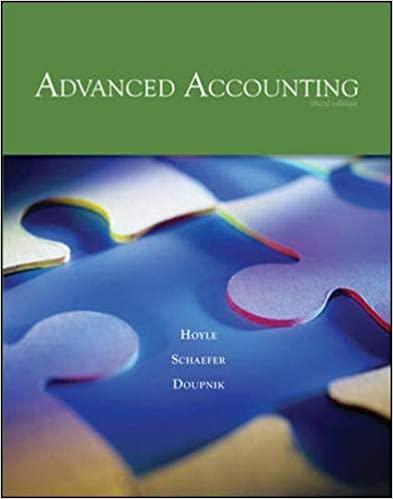Merrill acquires 100 percent of the outstanding voting shares of Harriss Company on January 1, 2008. To
Question:
Merrill acquires 100 percent of the outstanding voting shares of Harriss Company on January 1, 2008. To obtain these shares, Merrill pays $200,000 in cash and issues 10,000 shares of its own $ 10 par value common stock. On this date, Merrill’s stock has a fair value of $ 18 per share. Merrill also pays $10,000 to a local investment company for arranging the acquisition. Merrill paid an additional $6,000 in stock issuance costs.
The book values for both Merrill and Harriss as of January 1,2008, follow. The fair value of each of Harriss’s accounts is also included. In addition, Harriss holds a fully amortized patent that still retains a $30,000 value.
Harriss Company Merrill, Inc. Book Values Book Values Fair Values Cash..
$ 300,000
$ 40,000
$ 40,000 Receivables..
160,000 90,000 80,000 Inventory.
220,000 130,000 130,000 Land...
100,000 60,000
. 60,000 Buildings (net) .........
400,000 110,000 140,000 Equipment (net).
120,000 50,000 50,000 Accounts payable .......
(160,000)
(30,000)
(30,000)
Long-term liabilities .....
. . . . (380,000)
(170,000)
(150,000)
Common stock.
(400,000)
(40,000)
Retained earnings.
(360,000)
(240,000)
a. Assume that this combination is a statutory merger so that Harriss’s accounts are to be trans¬ ferred to Merrill’s records with Harriss subsequently being dissolved as a legal corporation. Pre¬ pare the journal entries for Merrill to record this merger.
b. Assume that no dissolution is to take place in connection with this combination. Rather, both companies retain their separate legal identities. Prepare a worksheet to consolidate the two com¬ panies as of January 1, 2008.
Step by Step Answer:

Advanced Accounting
ISBN: 9780073379456
9th Edition
Authors: Joe Ben Hoyle, Timothy S. Doupnik, Thomas F. Schaefer, Oe Ben Hoyle





